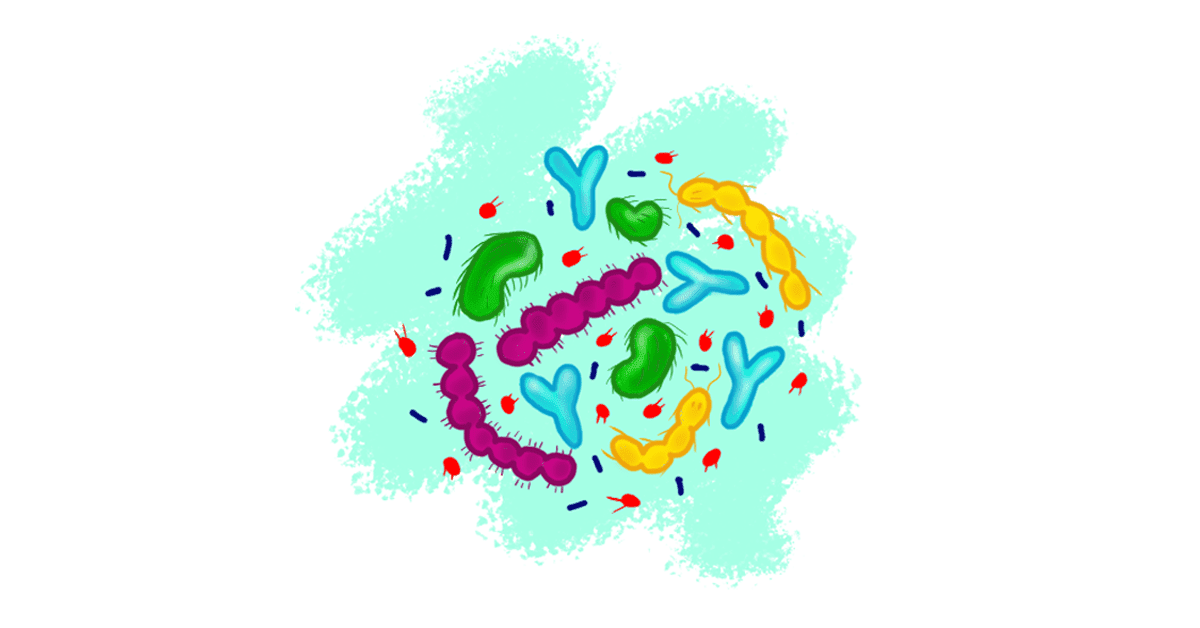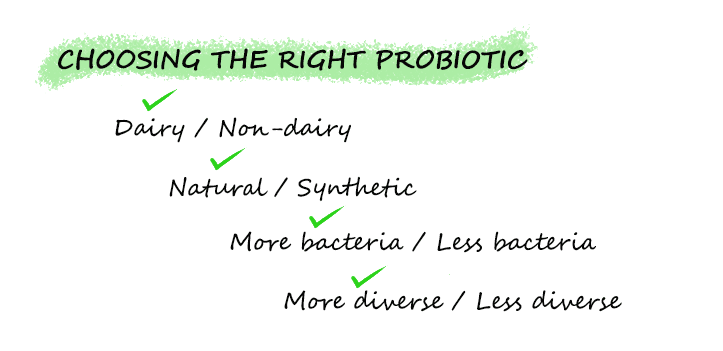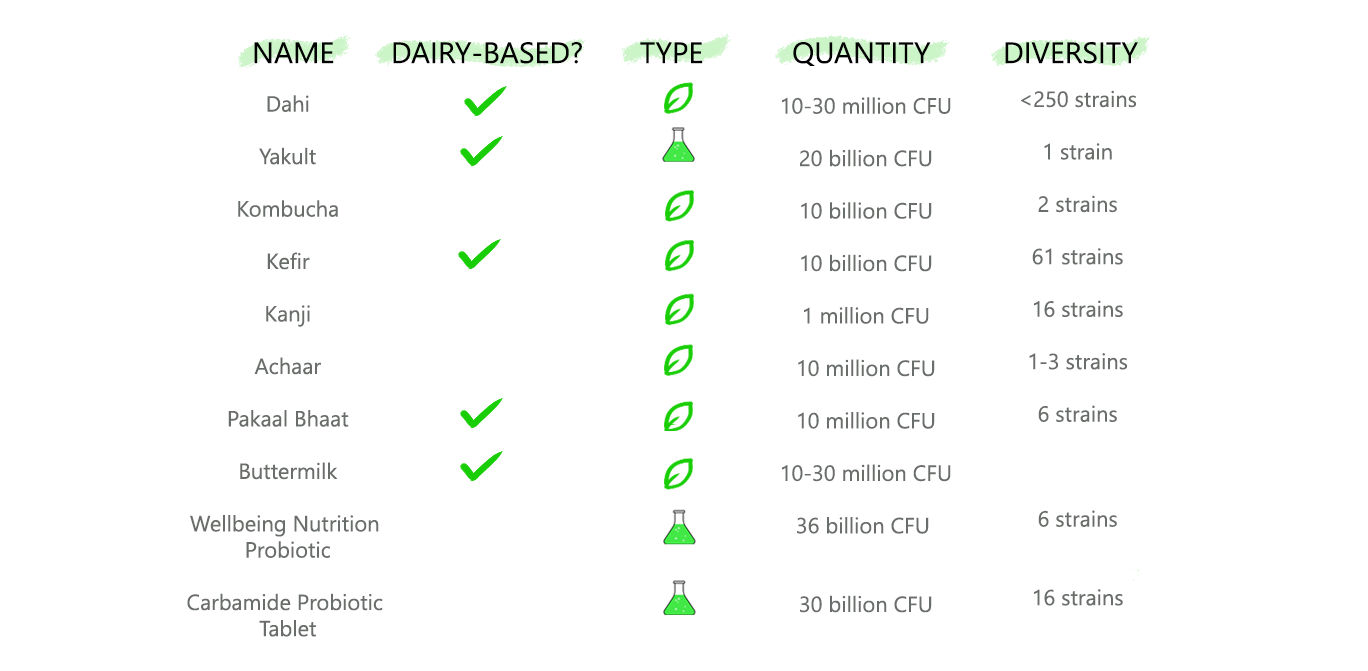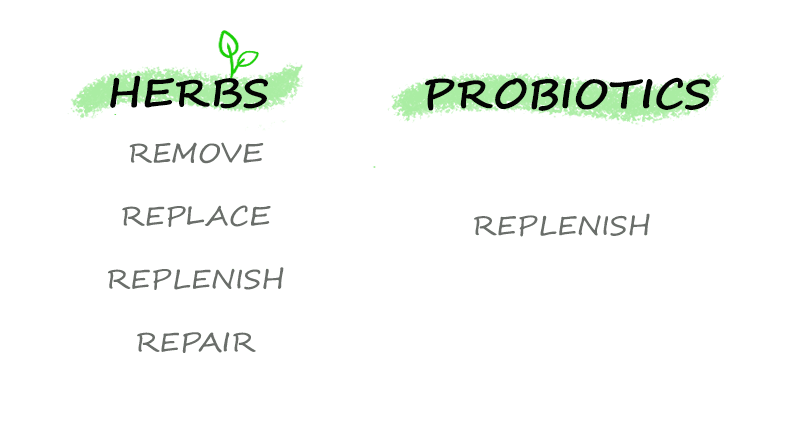Probiotic foods in India | A detailed comparison

Here’s the truth about probiotic foods in India 👇
If you eat real, unprocessed food and do not use antibiotics frequently…
…probiotics may likely have no effect on you.
Your body has 300 trillion bacteria and 500 different strains in the gut alone.
A strong probiotic pill has maximum 30 billion CFU and 5-7 strains.
This means one probiotic pill, daily, makes just a 0.01% difference.

Dirty
or Clean?
Free Analysis
The 0.01% may help a few.
But Harvard health suggests probiotics may be helpful for a select few.

There’s one other condition: every time you have taken a course of antibiotics.
A single course of antibiotics can wipe out 99% of your gut bacteria.
Just take a look at what happens when your body has zero gut bacteria.
That’s why a probiotic is recommended in these cases.
You urgently need to rebuild your gut bacteria, and a probiotic helps.

The juice to eat without bloating
❤️ by 300+ nutritionists
I want probiotic foods in India. How do I pick one?

There are four parameters to consider when selecting a probiotic.
- Dairy-Based or Non-Dairy Based?
- Natural or Synthetic?
- Quantity of bacteria (CFU / 100ml)?
- Diversity of bacteria?
Here is a table which lists out all the different types of probiotic foods in India, ranked on these four parameters.

Choose between dairy and non-dairy.
Are you lactose intolerant or do you have a difficult time digesting dairy?
If yes, then you may want to skip Dahi, Yakult, Buttermilk and Milk Kefir.
These are common, dairy-based probiotics foods in .
Choose between natural and synthetic.
A lot of people are looking for natural, food-based sources of probiotics.
If you are one of them, remove anything which says ‘synthetic.’
The difference?
Synthetic probiotics isolate bacteria from food, and then freeze dry it into a tablet, pill or packaged drink.
The bacteria isn’t exactly alive – it’s frozen.
Natural probiotics allow bacteria to grow in the food or beverage itself.
The bacteria are active and alive.
Which is better?
Mr. Abhishek Mukherjee, a microbiologist and gut-specialist says that active cultures perform better than freeze-dried cultures.
Research hasn’t provided a conclusive answer yet.
Then, select quantity.
Quantity means the number of bacteria present.
Ideally, you want to pick something with a higher count.
Why? Because bacteria have to make it to the large intestine to work.
That means your probiotic has to survive stomach acid…
…resist all digestive juices…
…fight other bacteria in your colon…
…and finally settle.
The idea is if you start with a larger number of bacteria in your food, there is a higher chance more will end up in your colon.
Finally, select strains.
Probiotic action is strain dependent.
Some strains will work for your body, and others will not.
So more strains are not always better.
Research indicates that lactic acid bacteria (with names like Lactococcus, Lactobacili and Bifidobacterium) contribute to the body.
Other bacteria like Streptococcus Thermophilus do not contribute as much.
Some manufacturers may put these less effective strains into a product…
…and call it a probiotic.
Be wary.
If you are buying natural probiotics off a shelf…
Check the product nutritional value for sugar content.
Bacteria need food to survive.
Sugar is one food source for bacteria.
Packaged foods usually contain a lot of sugar to keep their bacteria alive for long.
Excess sugar will likely hurt your gut health and cause digestive imbalance.
Here is a list of the most popular packaged probiotic food in India, by sugar content.

FAQs around probiotic food in India
#1 Will it help me get constipation, bloating or acidity relief?
It is impossible to know unless you know the cause of your digestive trouble.
For example, if your blood thinning medication is causing acidity, then a probiotic will likely not help with acidity relief.
Check out these guides to know more about the cause behind your acidity, constipation and/or bloating.
#2 Will probiotic food in India help my skin heal?
Possibly. Probiotics may improve gut health. Gut health is directly linked to skin health.
Today, specific strains of probiotic foods in India are being investigated for other conditions like eczema, UTIs, yeast infections, lactose intolerance, stomach and respiratory infections in kids.
However, research is still in its early stages.
#3 How long do I need to take a probiotic?
The duration and dose of probiotics are disorder-specific.
According to Harvard Health, for example, daily use for one to two weeks may improve infectious or antibiotic-related diarrhea …
…but four to five weeks is better to get rid of constipation fast at home.
#4 Are there any side effects?
Most certainly.
You are introducing an organism into your body.
If your body accepts the organism, you’ll be fine.
If not, there will be a side effect.
Short term side-effects include bloating, diarrhea and nausea.
With a new probiotic, always start small.
A smart alternative to probiotics: herbs.

The objective of a probiotic is to improve gut health, so that overall health improves.
But a probiotic is not enough on its own.
Health practitioners agree that there are three steps for good gut health.
- Remove (toxins and pathogens)
- Reinoculate (good gut bacteria population)
- Repair (gut wall)
A lot of people are now moving to herbs instead of probiotics as a better gut health solution.
These herbs:
- Increase the diversity of your gut bacteria
- Promote good bacteria and remove harmful bacteria
- Act as food for bacteria
- Come with antioxidant compounds which help repair the gut wall
Essentially, some herbs function exactly like a probiotic ++, without the harmful side effects.
Take a look at Kalmegh.
Why herbs > probiotic food in India
Kalmegh leaves are naturally found in nature, whereas synthetic probiotics are processed forms of bacteria.
Unlike probiotics where an organism is entering your body, Kalmegh leaves are functional food with no side effect.
Whereas a probiotic helps with only 1 step of the gut healing process (reinoculate), Kalmegh helps with all three (remove, repair and reinoculate).
Another herb with a similar effect: Turmeric.
You can take a look at the research yourself here.
A lot of people are opting for herb-based gut health solutions versus probiotics.
One that is making the rounds is Kalmegh Bitters.
Try it for yourself to see how it improves your gut health.

The juice to eat without bloating
❤️ by 300+ nutritionists



![Isabgol side effects that may SHOCK you [2024 Update]](https://gethugg.com/wp-content/uploads/2021/03/feature-8-768x402.png)




